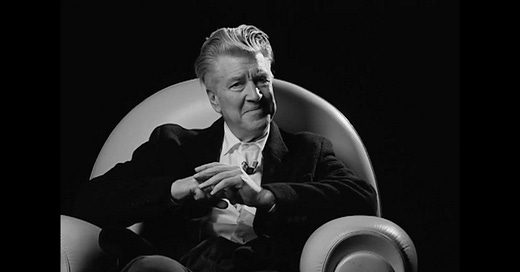“I don't think that people accept the fact that life doesn't make sense. I think it makes people terribly uncomfortable.” - David Lynch
I chose to start this post with a quote that closed my last one about David Lynch because, in all honesty, it doesn’t make sense that he is gone. I can’t claim any unique insight into his work or his legacy. The last few days have provided us with a panoply of remembrances that wrestle with what he meant to us, and what his art meant.
I felt so floored by his death this week, as did countless others, because his work means so much to me. Not just because I love everything he’s made (Twin Peaks was my first love, and I even consider myself a Dune apologist), but because his presence in this world and in our culture helped me believe that anything was possible. That there was a place for strangeness, for oddity, for a mismatched, ragtag aesthetic that was as undefinable as it was definitive.
Which brings us to a thorny crossroads that he, in his lifetime, refused to broach. He famously loathed explaining his works, frustrated that people’s desire to understand outweighed their ability to experience.
In interviews, you could practically see the physical pain it caused him when pressed to give some clue as to what was going on in a particular sequence, what was the meaning of a certain sound or symbol, what was the thread that connected one of his films to another? He always seemed to imply that by trying to understand the mystery, by trying to find an answer to the questions he posed, we were drifting farther away from his intent.
One piece of the puzzle, I think, is his background in fine art. He studied painting at the Pennsylvania Academy of the Fine Arts, and painted throughout his life. A much older medium than film, painting has long evolved past the phase of needing to faithfully represent a literal thing. A painting can be a reflection, a mirage, a question, a memory from a dream, an image that meant something the moment it came to you, something else by the time you finished it, and something else again the next time you looked at it.
One of the main lessons I took away from my own training (not in painting, but in theater) was that there was value in not knowing. Time and again our teachers told us to embrace discomfort, to surrender to the experience of creation, and to be open enough to surprise ourselves. It’s scary to let go of the scaffolding of what is knowable, but the freedom you gain in allowing the mystery to drive you forward forces you to dig deeper, to listen more attentively, to dream more vividly.
This may all seem very pretentious, but I think it gets at the center of much of Lynch’s work. He spoke often of Transcendental Meditation, of how much it expanded his consciousness (and therefore his creative practice) because it allowed him to receive inspiration that wasn’t confined to the physical world that we can see, hear, touch, and smell.
But, at the core of all that evasiveness, is love. A love of the world and all its inconsistencies, all the strange unexplainable occurrences, all the brokenness we’re forever trying to mend. If there is a thread that runs through his work, it’s not a connection of one abstract idea to another, but the connection between human beings. He was a student of the human heart more than anything.
It seems to me that his only real goal was to translate some piece of his heart and his soul onto celluloid to share with us. I would argue that even he didn’t literally understand what every idea that came to him meant. There was a clarity to his purpose that transcended literal interpretation.
When I watch Blue Velvet, Mulholland Drive, Twin Peaks, Eraserhead, or Dune, I see people searching, reaching out not just for answers but for someone to walk into the darkness with, whatever secrets it may hold.
In a kind of meta way, this is the covenant of cinema. Sitting in the dark, alone with other people, experiencing images that are both real and artificial to emerge into the light again, somehow altered. With every frame, he gave a piece of his brilliant mind: twisted, pure, funny, and confounding, not for us to understand but for us to receive.
He didn’t want answers. Answers were final, complete, comfortable. Life, as he so succinctly put it, doesn't make sense - so why should art make sense? If it only ever soothed us, delivering tidy pieces of life in digestible forms, we would never get to experience the wonder of not knowing. That, I think, was his greatest gift to us.
There’s so much beauty in the world, and so much agony. We can never square why both those things are true, but we can be grateful we don’t have to have all the answers. We have coffee, pie, and diners, sunshine, trees, and long drives at night, nice suits, Roy Orbison, and cheeseburgers. And we have each other. Despite all the suffering the world can hold, it can hold all those good things too.
There isn’t a neat way to end this piece. There isn’t a tidy way to sum up the loss we all feel, so I’ll end with an anecdote:
Living through the COVID lockdown in L.A., my local NPR station programmed his YouTube weather reports and I always looked forward to turning on the radio in the morning. That voice, friendly and bizarre, reminded me of all those good things, and all the good people out there who were listening along, smiling. That’s the memory of David Lynch that I’ll hold most dear.
The best part was his sign-off, which always went something like, “We’ll have clear skies and golden sunshine all along the way. Everybody, have a great day!”






so beautiful quinn!!!! 😭